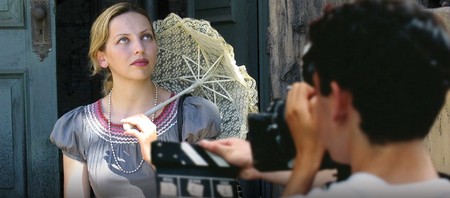Rehearsal is when the timing and pacing of the play and the acting from moment to moment is established, both of which are the key to communicating with the audience. The prime example of timing and pace is the act of the stand-up comedian, whom we can describe as a solo actor, telling the audience about the drama of his life, the people he meets, the misfortunes that usually befall him (remember the actor’s function as storyteller, as explored in the invented sci-fi narrative. Let’s look at a passage of text to see what precise quality of timing is needed to make it work for the watchers and listeners. This extract is from A Flea in her Ear by the master of farce, Georges Feydeau.
Raymonde is in charge of the surprises and Lucienne acts the role of the surprised ‘feed’. The paradox is that two elegant women are having a perfectly serious discussion about an intimate and suggestive item of menswear, and the braces themselves, produced with a flourish like a rabbit from a hat, take on a bawdy life of their own. The second paradox is in the way Raymonde thinks; she believes it entirely correct that a wife should sift through her husband’s mail. ‘Precisely’ is the key to Raymonde’s playing of the scene. She is rapid and neat of speech, because she has already found her husband guilty. So she must fire off a series of statements and questions which catch Lucienne off-balance; Lucienne responds with what I can only describe as fast dithering; her timing is dictated by the fact that she is struggling to keep up with the speed of Raymonde’s thoughts. Raymonde’s attack is clean and quick and throughout she is slightly increasing the pace before getting to the punchline, and Lucienne’s attack often starts with a small pause.

The actresses and the director should try to anticipate where the laughs are going to come, though this can never be firmly determined till the scene has been played before several audiences. Raymonde states the obvious by saying A pair of braces’ with tart disapproval, which should produce a chuckle, and Lucienne’s follow up 1 can see that’ can also get a laugh if thrown away in mock alarm. The enchanting Geraldine McEwen, in a celebrated production at the National Theatre, made Raymonde even funnier by investing her with a plummy swooping contralto voice capable of every innuendo. The quick-fire exchange can only be created in rehearsal, but the scene is utterly dependent on the agility of the timing, and Raymonde is also controlling the speed of the audience’s reactions.
The timing of a performance and the timing of a scene between actors is already implicit in a well-written text, but is capable of adjustment. If you are asked to play a scene or part of it more quickly, don’t respond by rushing the words; speak them with greater agility, but find a reason for a quicker pace in the character and text. For example, the actress might think; I’ll heighten the mood; she’s more impatient than I’m playing her, more excited or crosser.
Similarly, when asked to slow down the tempo, handle this by appearing to choose the words used with greater care, finding obstacles and difficulties in a character’s understanding. The scene we’ve just looked at is capable of such adjustments: Raymonde can fizz with indignation and over-rule Lucille; or Lucille can fail to comprehend exactly what Raymonde is getting at. Raymonde may dramatize the situation she imagines she’s in, feeling self-pity and betrayal as well as indignation and suspicion.
Listening and reacting
The timing of a scene will only emerge if the actors are listening to each other with the greatest concentration. Acting is action and reaction, and one of the most valuable actors is he or she who can play in a long scene where he’s got little to say and a lot to listen to. It’s wise to write your own sub-text, a scenario of your part in the scene – how you are affected, influenced or changed by what the other characters say, and how much physical and facial reaction is called for. This should always be economical, true to both character and situation. Over-reacting, unless it has a dramatic reason, destroys credibility, though it is a device often used in comedy as an expression of disbelief. The very major part of reaction is achieved simply by listening.